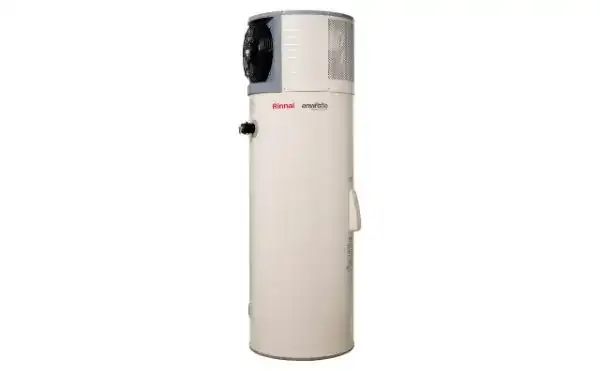How does a heat pump hot water system work?
Are you looking for an innovative hot water heating system?
Given the wide range of hot water systems available today, it's understandable to be confused as to how each one actually works and the advantages they offer. As consumers, we need to know how our appliances or products work to be able to make an informed decision about their suitability to our personal needs before purchasing. This particularly applies to bigger investments such as hot water systems. If you are in the market for a new hot water system and are considering having a heat pump system, ( also known as a heat pump water heater ) installed we hope this information page will help you with your decision-making. Heat pump hot water systems are renowned for being an energy-efficient way to heat water for residential and commercial purposes, offering at least 50% more energy efficiency than a traditional electric system, which will save you money on your monthly energy bills. One significant advantage of heat pump hot water systems is their ability to provide hot water even in colder climates, as they can extract heat from the air even when it's chilly outside. Depending on your climate zone this one feature could make a heat pump system the perfect fit for your needs. However, their efficiency can be affected by the temperature of the air and the location of the unit, where proper installation and maintenance are essential to maximise their performance.

Operational Principles of a Heat Pump Water Heater:
Heat pumps have a continuous cycle of evaporating, compressing, condensing, and expanding the refrigerant allowing the heat pump to efficiently transfer heat from the surrounding air to the water in the tank. By using electricity to power the compressor and fans rather than generating heat directly, a heat pump hot water system can be much more energy efficient than traditional electric resistance water heaters or gas water heaters.
Basically, heat pump hot water systems work on the same principle as an air conditioner or refrigerator but in reverse.
- Evaporator - The process begins with an evaporator unit, typically located outside or in a well-ventilated area. This unit contains a refrigerant, which is a fluid with properties that allow it to change from a liquid to a gas at a low temperature.
- Absorbing heat- The evaporator coils are exposed to ambient air, and a fan helps draw in the air. As the refrigerant inside the evaporator coils is colder than the air, heat from the air is absorbed by the refrigerant, causing it to evaporate and turn into a low-pressure gas.
- Compression - The gaseous refrigerant is then compressed by a compressor. This compression raises the temperature and pressure of the refrigerant.
- Condenser- The hot, high-pressure gas is passed through a condenser coil located inside the water tank or nearby. As the hot gas circulates through the coil, it releases heat, which is transferred to the water in the tank. This heat transfer causes the refrigerant to condense back into a liquid.
- Expansion valve - After the heat has been transferred to the water, the high-pressure liquid refrigerant passes through an expansion valve, which reduces its pressure and temperature, preparing it to start the cycle again.
- Repeating the cycle - The now low-pressure liquid refrigerant returns to the evaporator, where it can absorb more heat from the surrounding air, and the cycle repeats.
Heat Pump Hot Water System Brands Include:

For all your plumbing needs or if you would like more information about heat pump hot water systems contact Leak Free Plumbing Solutions on 0422 392 447 to speak to one of our experienced team.
Reference - https://www.energy.gov/energysaver/heat-pump-water-heaters